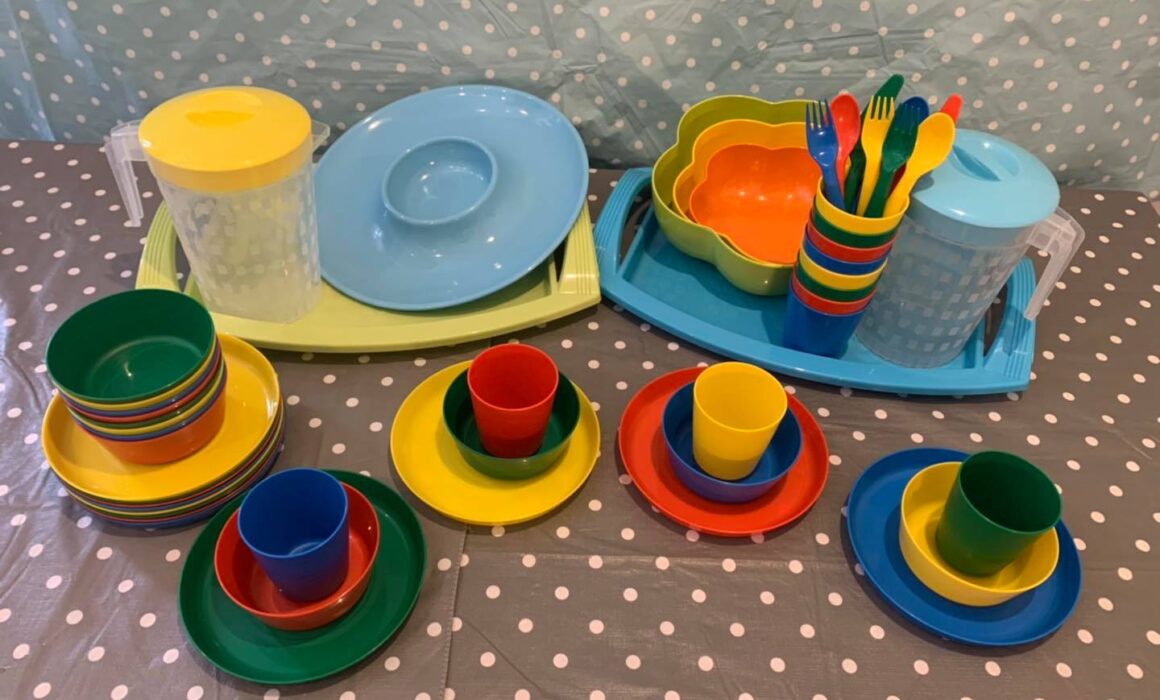Why plastic?
A few months ago, we conducted a survey for whether adults would prefer to hire melamine tableware as opposed to the existing kit we had on offer.
A few months ago, we conducted a survey for whether adults would prefer to hire melamine tableware as opposed to the existing kit we had on offer.
Although the response was mainly positive, when we looked into melamine, we decided not to supply it. The reason for this is that the production of melamine includes very toxic gases being leached into the atmosphere, including formaldehyde, and it is not an end-recyclable product. We did not feel that it fits with our values as a business.
Why, you might ask, do we feel differently about the existing plastic tableware we supply? Well, for a start, they are end-recyclable. Of course, our aim is to reuse this tableware for many years, but knowing they will not contribute to landfill waste at the end of their lives, is very important. Also, the products are BPA free.
Ikea in general has lots of eco-credentials and are continuously working to improve upon these. Details from their website below:
Plates
BPA (Bisphenol A) free IKEA has banned BPA (Bisphenol A) in plastic products in the children’s range (0-7 years) and in all food-contact products. IKEA phased out BPA already in 2006.
Facts about plastic at IKEA: * By 2030 we will only use renewable and or recycled materials in our plastic products * By 2020 we will phase out single-use plastic * 85% of the plastic in ISTAD bags is made from renewable material from the sugar cane industry * PLA (polylactic acid) plastic is made from renewable sources like corn, sugar beet and sugar cane
We did briefly consider bamboo tableware as an alternative. However, having used bamboo at home, personally we do not like it. It does shatter if dropped onto a hard floor, and the pieces can be very sharp. In addition to this, we retain environmental and safety concerns regarding bamboo. Bamboo dishes are formed with fibres of bamboo and melamine used as a binder. As widely reported last year, bamboo is not safe to eat or drink hot or acidic items from, largely due to an unregulated and therefore highly variable manufacturing process. In studies, around 35% of bamboo vessels were found to leach unsafe amounts of chemicals into the bloodstream.
In summary, BPA-free plastic dishes were the safest, lightest, most easily available items we could find for children’s party ware!
However, for a more grown-up party we do have a wonderful and very environmentally friendly alternative….
Preloved and vintage crockery! What could be more environmentally friendly than preloved items?
Why, you might ask, do we feel differently about the existing plastic tableware we supply? Well, for a start, they are end-recyclable. Of course, our aim is to reuse this tableware for many years, but knowing they will not contribute to landfill waste at the end of their lives, is very important. Also, the products are BPA free.
Ikea in general has lots of eco-credentials and are continuously working to improve upon these. Details from their website below:
Plates
BPA (Bisphenol A) free IKEA has banned BPA (Bisphenol A) in plastic products in the children’s range (0-7 years) and in all food-contact products. IKEA phased out BPA already in 2006.
Facts about plastic at IKEA: * By 2030 we will only use renewable and or recycled materials in our plastic products * By 2020 we will phase out single-use plastic * 85% of the plastic in ISTAD bags is made from renewable material from the sugar cane industry * PLA (polylactic acid) plastic is made from renewable sources like corn, sugar beet and sugar cane
We did briefly consider bamboo tableware as an alternative. However, having used bamboo at home, personally we do not like it. It does shatter if dropped onto a hard floor, and the pieces can be very sharp. In addition to this, we retain environmental and safety concerns regarding bamboo. Bamboo dishes are formed with fibres of bamboo and melamine used as a binder. As widely reported last year, bamboo is not safe to eat or drink hot or acidic items from, largely due to an unregulated and therefore highly variable manufacturing process. In studies, around 35% of bamboo vessels were found to leach unsafe amounts of chemicals into the bloodstream.
In summary, BPA-free plastic dishes were the safest, lightest, most easily available items we could find for children’s party ware!
However, for a more grown-up party we do have a wonderful and very environmentally friendly alternative….
Preloved and vintage crockery! What could be more environmentally friendly than preloved items?

